‘Sexual assault cases are different to other crimes’: Suzie Miller’s writing takes on the law
Lawyer turned Olivier Award-winning playwright Suzie Miller is not done shining a light on injustices that victims of sexual assault - both male and female - face in our judicial system.
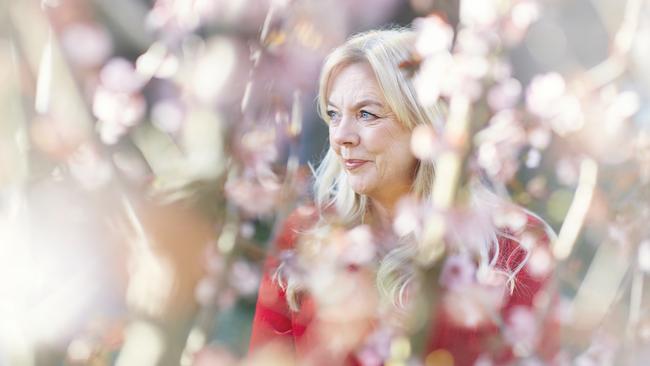
At age 11, Suzie Miller wanted to change the world so she started with a paper round. “Paper boy wanted”, read the sign outside the Carlisle St newsagency in Melbourne’s St Kilda. It was 1975 and young Suzie had a tough time convincing the newsagent of her bona fides, ultimately winning him over by promising that if she didn’t perform better than the boys, he could sack her on the spot. True to her word, she was hardworking and rain-hail-or-shine reliable. When his star employee turned 12 and left for pastures new, her boss was distraught. The next day, a sign went up in the window: “Paper boy – or girl – wanted”.
Today Miller, 59, is a criminal defence lawyer turned internationally celebrated playwright, riding high on the crest of her smash hit legal drama Prima Facie. But she can conjure up the satisfaction of that long-ago victory like it was yesterday. “I remember thinking, ‘I made a difference’,” she says over tea and Tim Tams in the majestically chaotic study of her inner-west Sydney home. “I’ve always had that fire in me, to stand up and say, ‘It’s not fair that things aren’t equal’.”
Prima Facie is making a difference in a way the pioneering paper girl could never have imagined. Earlier this year, the one-woman play, about a female barrister contending with the fallout of a sexual assault, won an Olivier Award for Best New Play, as well as an Olivier and a Tony for its star Jodie Comer (Killing Eve). A sell-out season on London’s West End was followed by a triumphant Broadway run, breaking box office records and drawing celebrities including Al Pacino, Jerry Seinfeld and the cast of Succession. Monica Lewinsky came one week; Hillary Clinton the next.
Set to clock up productions in 30 countries, in a multitude of languages, the play has become a juggernaut. There’s a film version shooting in London with Oscar-nominated Harriet star Cynthia Erivo in the lead, and this month Miller will feed the industry’s gluttonous desire for content by releasing a novel adaptation of the play.
“When I wrote it I thought, ‘That play will never get produced’,” she says. “A one-woman show about rape – who’s going to do that? No one. Then suddenly #MeToo happened and it was on its way.”
Miller has written dozens of plays since leaving the bar in 2010 to become a full-time playwright. Jailbaby, an unflinching look at male rape in prison, last month finished a successful Sydney run, and the Sydney Theatre Company just announced a 2024 revival of RBG: Of Many, One, her hit play examining the life of the late US Supreme Court justice Ruth Bader Ginsburg. Many of her plays are prompted by the distressing stories she encountered while representing society’s downtrodden as a human rights lawyer and a children’s rights lawyer; most of them stir debate.
But Prima Facie has set an entirely new benchmark for the social impact a piece of entertainment can deliver. Sharply written and mightily performed by an incandescent Comer, it’s a primal scream of a play, fuelled by Miller’s outrage at the way the system fails sexual assault victims. First performed by Australian actor Sheridan Harbridge for Sydney’s Griffin Theatre Company in 2019, it follows Tessa Ensler, a barrister from an impoverished background working hard to fit in to an elite, male-dominated arena. Tessa specialises in defending men accused of sexual assault, and opens the play boasting about the tactics she uses to bait victims in the witness box. So deft in cross-examination, she is forced to confront the structural biases of the legal system from the other side when she is raped by a colleague.
The play has clearly hit a nerve. “Jodie [Comer] and I have had thousands of people writing to us and coming to the stage door after shows and every one of them would just say: ‘Thank you. This is my story’,” she says.

Prima Facie has altered perspectives, yes, but it has also directly led to changes within the legal system. A National Theatre Live recording of the play is now mandatory viewing for high court judges considering sexual assault cases in Northern Ireland. “Isn’t that amazing?” says Miller. More, it has led barristers and judges in Britain to establish TESSA (The Examination of Serious Sexual Assault), an organisation named for the play’s lead character and dedicated to the reform of sexual assault laws. Miller tells me that a month ago, 3000 English police officers watched the National Theatre Live show as part of their training. The chief inspector wrote to tell her it had prompted conversations among the officers about providing better care while taking statements from sexual assault victims. “He said that he looked back on his career and felt ashamed that he hadn’t realised what the women were going through,” she says.
There’s talk of a one-off show exclusively for judges, to be performed within the Edwardian surrounds of London’s Old Bailey, the storied criminal court considered by many a living museum to the law. Maybe that will become the pinnacle of Miller’s career. For now, for the former lawyer with an inborn hunger for redressing imbalance and contesting inequality, the heights are dizzying enough.
She recently answered a call from a UK judge who had seen Prima Facie and was spurred to rewrite the directions given to juries before sexual assault cases, warning of the impact trauma can have on a victim’s testimony. “When I put the phone down, I thought, ‘I’m not actually a lawyer any more, I’m a playwright’,” Miller says, “but of all my training and all the conversations I’ve had, that tiny conversation that went for ten minutes might be the biggest thing I ever did in my life. [That judge] just changed [jury directions] for the whole of the UK; I don’t even know how to process that. And then it made me think, hopefully here as well, that change can occur.”
She’s conscious that change at home will inevitably lag behind the UK, as theatre here does not have the same quasi-religious following. “Theatre in London is taken so seriously,” she says. “It’s like sport in Australia. It actually is part of the contemporary conversation there; people go to it to have a conversation about their community and about their society and about value systems. I hope people do that in Australia as well, but we just don’t have the big audiences they have in the UK. I’m very attracted to working there for that reason, obviously.”
The path that took Miller from working-class Melbourne schoolgirl to the bright lights of Broadway was as circuitous as an inner-city paper round. Having excelled at maths and science, she went on to do a degree in immunology and microbiology at Monash University before deciding life in the lab was too hushed and stifling. Miller loves to talk. A law degree from the University of NSW led to a brief stint in corporate law, but her appetite for effecting social change soon prompted a move to the Aboriginal Legal Service and then the non-profit Public Interest Advocacy Centre.
Later, while working at the Shopfront Youth Legal Centre in Kings Cross, she found herself taking up to six statements a week from sexual assault victims, “most of them horrific”. “Many of them would never get to court, and if they did, they’d lose,” she says. “It was just emphasising what I’d thought since law school, that the system is stacked up against anyone ever actually being able to prove they were a victim of this incident. There was nothing in it for them [by testifying in court] but they did it because they felt it was the right thing to do and then they were demolished on the stand.”
Miller would carry the seeds of this injustice around in her head for many years, worrying at this vexing “knot” in the law, before working through the problem with Prima Facie. “I just think about things a lot,” she says. “When something doesn’t make sense, I really zone in.”
Her recent play Jailbaby, for instance, asks the question: Why does society seem to consider male-on-male rape an unremarkable consequence of incarceration? “It’s a form of state-sanctioned torture,” Miller says. “I feel that it’s like, ‘Oh well, that’s just what happens; young boys go into prisons, they get beaten up, raped’, and they’re completely destroyed psychologically.”
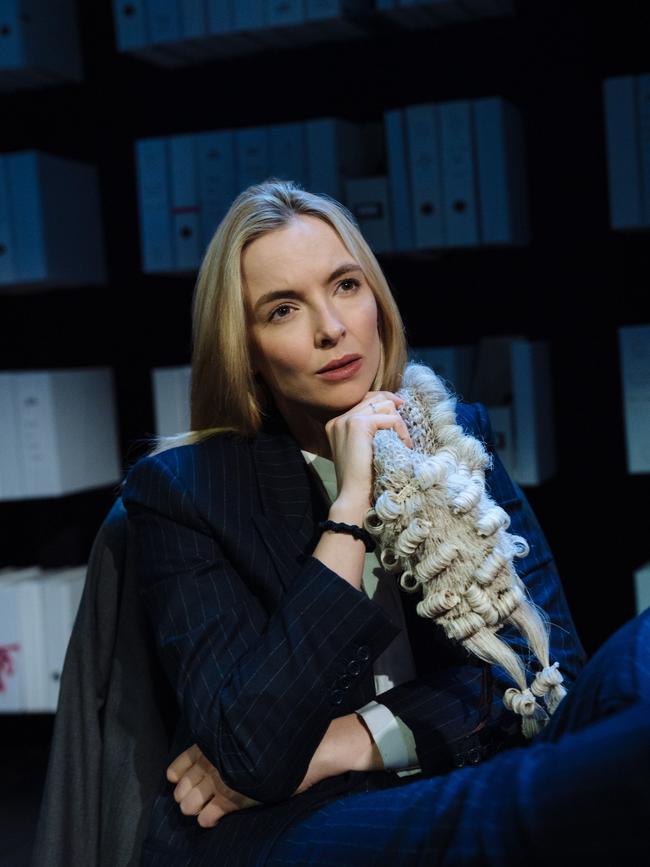
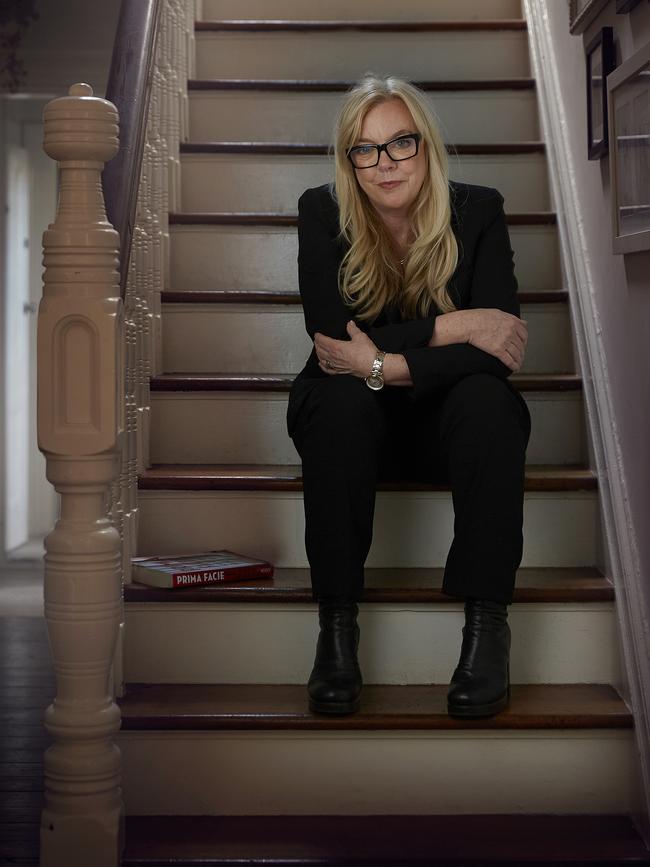
Miller considers Jailbaby a “spiritual sequel” to Prima Facie; Inter Alia, a play she’s currently working on for London’s National Theatre, will complete a loose trilogy about the need for justice reform. “I definitely believe in innocent until proven guilty,” Miller says, “but I think sexual assault cases are different to other crimes. I feel it’s very gendered.”
The problem, she says, is that the law requires that evidence be delivered in a tidy and consistent package, whereas victims of sexual assault are rarely in a position to do that. Often, they have retreated into survivor mode, rendering details blurry. The situation is even murkier when there’s a relationship involved.
While continuing to work as a solicitor at Shopfront, Miller embarked on a masters in theatre and film at UNSW, followed by a playwriting course at the National Institute of Dramatic Art. She also has a PhD in maths and theatre (“I know,” she says. “It’s weird.”) At NIDA, Miller developed her first play, Cross Sections, which drew on her experience advocating for the street kids, sex workers and homeless of Kings Cross. The play was picked up by the Sydney Opera House in 2005, and won an Australian Writers’ Guild Award.
It was during her stint at the Public Interest Advocacy Centre that she met her now husband Robert Beech-Jones, a NSW Supreme Court judge who last month was elevated to the High Court of Australia. Miller needed a barrister to work pro bono on a test case involving Indigenous youths and a colleague recommended Beech-Jones. Initially wary of his “posh” double-barrelled name, Miller – who admits to having “a chip on my shoulder about class” – relaxed when she learned of his poor Welsh ancestry and passion for human rights.
The two young lawyers began dating, sharing candlelit dinners and talking deep into the night about their shared love of … mathematics. “That was our first kind of connection,” Miller laughs. “Robert did applied maths at university and I was more into pure maths and we’d talk about black holes and the philosophy of maths and science, drawing equations on the paper tablecloth.” Maths-centric flirtation led to a 26-year marriage and two children, now in their early twenties. At home in their characterful, century-old manor, the couple share a study, playwright and judge often facing each other agreeably across two large wooden desks amid shelves crammed floor to ceiling with books.
“This is my happy place,” Miller says, leaning back in a chair wrapped in a sheepskin rug. Folders and exercise books are stacked haphazardly on the floor, and a whiteboard still bears rough notes for Jailbaby. A bobblehead of Ruth Bader Ginsburg sits atop a black marble mantelpiece, plonked incongruously alongside the prized Olivier award.
A fire crackling in the hearth keeps the late autumn chill at bay as Miller recalls the early days of an enduring romance. “Robert wrote me a sweet card, all in mathematical symbols, that said basically he was going to be with me for infinity,” she says. “I remember he said, ‘You’re the only woman that I know would understand what it says’ and I thought, ‘You’re the only man who would give this to me’. There was something really special about that.”
Miller has not practised law for some time and her people now are theatre people. “I’ve got so many friends in that world now that I can’t even imagine how I ever lived outside it,” she says. But being married to a high-ranking judge means she still rubs shoulders with those whose day job she has interrogated pretty thoroughly. Do the lawyers, figuratively speaking, pelt her with bread rolls at dinner parties? “They’ve been the opposite,” she says. “It really is amazing to me because I just assumed that I would be really out of the fold now. But the great thing about lawyers is they’re really into questioning things that don’t add up, and asking how things can be made more consistent or more rational.”
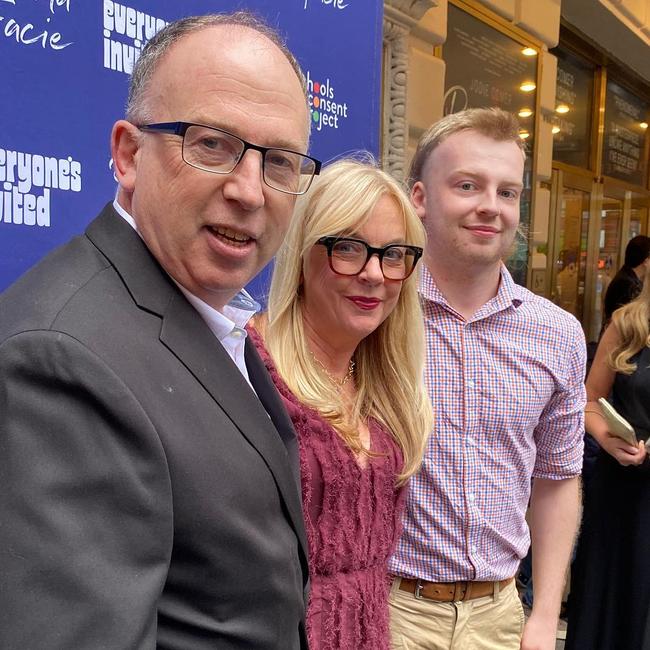
She says she’s often “dragged out” to do Q&As with members of the legal fraternity, “which is a big responsibility when you’re not actually a practising lawyer, when it’s really a jurisprudence issue for me.”
In 2011, Miller was working part-time as a lawyer and writing plays every other day when she hit a crossroads: an offer to take up a residency at Britain’s prestigious National Theatre arrived at the same time as she was offered a position as a NSW magistrate. She decided in an instant, and the family moved to London, with Beech-Jones, then a QC, gallantly enduring a London-Sydney commute. Eighteen months later they were back in Sydney, but Miller remains peripatetic, commuting between Sydney and writing rooms in London and the US, where she has set up a boutique production company to field growing film and television interest. She works at a relentless pace.
“Lawyers have to churn out a lot of information quickly, so possibly it’s because I was a lawyer or maybe it’s just the way my brain works,” she says. “When I’m actually writing, I just put my head down and go, but I spend a lot of time preparing for that moment. I do all the research, then summarise the research in these little exercise books that are all over the house, and then I just write into that world.” In preparation for writing RBG, “this study was filled with books about [Ginsburg] and copies of cases that I’ve annotated and everything she’d written and I was completely absorbed in her life.”
In the works currently: a romantic comedy called Life’s Too Short and a filmed version of her play Dust; an original series called Creatures of Mayhem, about a group of lawyers, and a TV adaptation of Heather Rose’s novel Bruny as well as a play called Sanctioned by the State for Sam Mendes’ Neal Street Productions. “I have people offering me things but I say no to most of them,” she says. “I want to clear the decks so I can just dream a bit too.”
Miller has written plays, film and TV scripts, even an opera, but the upcoming adaptation of Prima Facie will be her first novel. Writing it, she says, was a “fantastic” experience, not least because the process reversed the writer’s credo, “kill your darlings”. “A lot that was in the first vomit draft of the play, which I had to cut as it would have run for three hours, went into the book,” she says. “And there was something lovely about having all my tent poles lined up from the play.”
In spite of her gregarious nature, she enjoyed the solitude. “It’s not about the actors and the director and the designers and the sound technician and the stage manager and the producer,” she says. “It’s just about the writing.” There’s power in the immediacy and momentum of words spoken from a stage, but a novel carries the message further. Was it a desire to make the content accessible to more people that urged Miller to explore a new medium, or was she compelled to flesh out Tessa’s story? “I had more to say,” she says immediately. “I certainly don’t feel like that about all my plays, but there was something about this character. I’d written so much about her that I’d been desperate for people to know and I’d had to reduce it down for the play. I enjoyed the chance to sort of dig in and just be in her skin for a while.”
The novel intensifies the intimacy of Tessa’s story, adding layers and texture to her character by delving further into her working-class background and expanding her world to include loving but fraught relationships with family and close friends. The sexual assault at the core of the story becomes even more harrowing, if possible.
It was nearly 50 years ago that Suzie Millerset about changing the world, one rolled-up newspaper at a time. Time has not tempered her ambition, and theatre has provided a platform beyond her wildest dreams. Thousands have seen her plays; she’s opened a dialogue about the failures of the legal system and, in the case of Prima Facie, effected concrete change. For Miller, the micro moments – someone moved to send a deeply personal message, or admit to reconsidering consent – resonate as well.
“Realising a thought that you had that turned into a story has impacted someone’s life is a very special feeling,” she says. “It’s a privilege to be able to do it. I think humans have a very good sense of when someone is in pain or when someone’s been treated unfairly, and sometimes it’s just about doing what you can do, wherever your skill-set lies. Just be a bit brave and a bit bold. I believe there’s a better world that we can create.” b


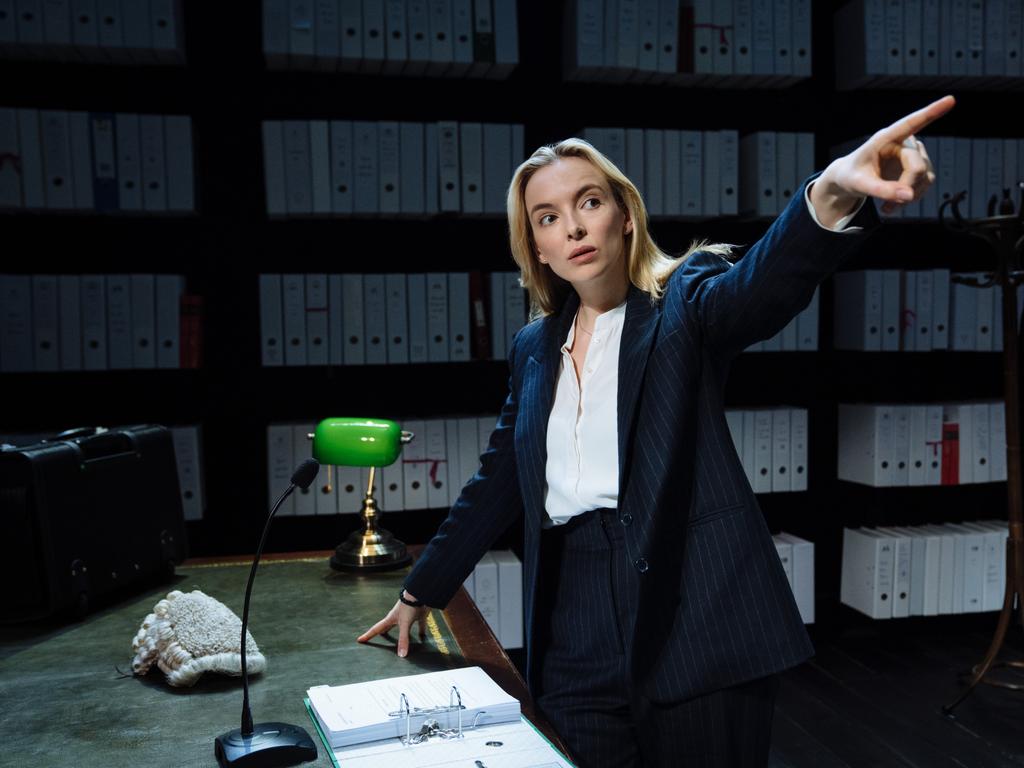

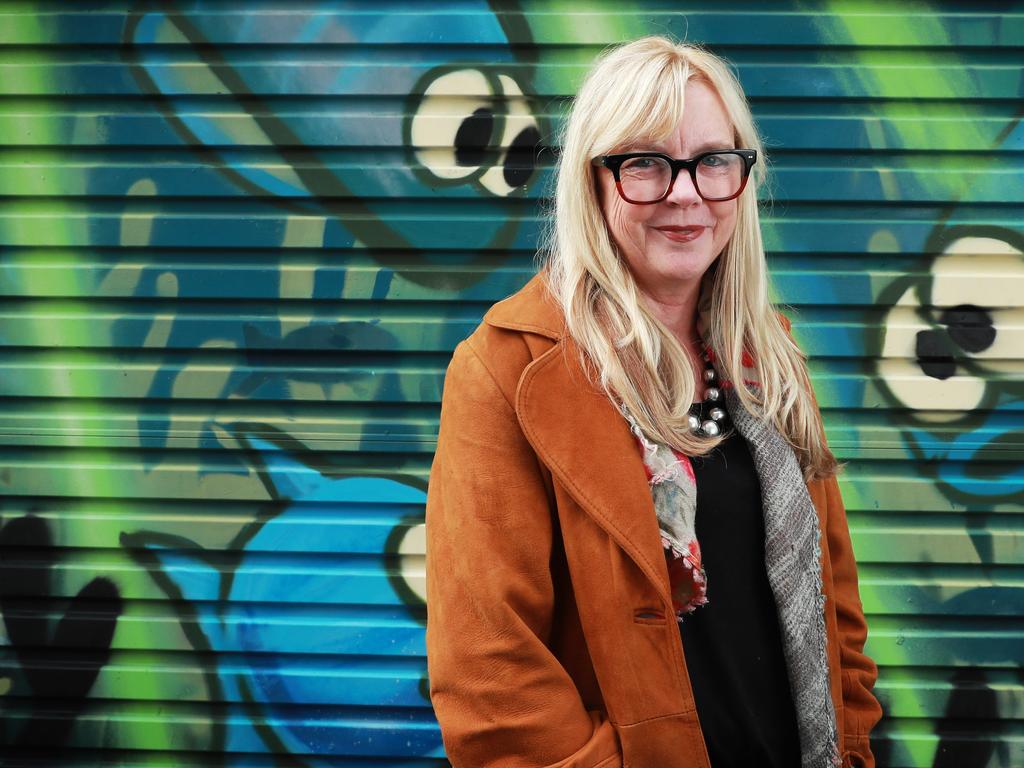



To join the conversation, please log in. Don't have an account? Register
Join the conversation, you are commenting as Logout